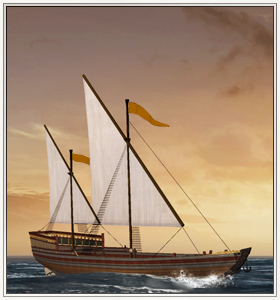Difference between revisions of "Dhow (ETW Unit)"
(→Overview) |
Tango12345 (talk | contribs) (Reverting: Simple vandalism) |
||
| Line 1: | Line 1: | ||
{{Unit|image=[[Image:Dhow.png]]|Class=Trading Ship|Men=11|Guns=1.5|Recruitable From=Trading Port/Commercial Port/Commercial Basin/ Global Trading Company|Region=Worldwide|Recruitment Cost=500|Upkeep Cost=50|Technology Needed=None}} | {{Unit|image=[[Image:Dhow.png]]|Class=Trading Ship|Men=11|Guns=1.5|Recruitable From=Trading Port/Commercial Port/Commercial Basin/ Global Trading Company|Region=Worldwide|Recruitment Cost=500|Upkeep Cost=50|Technology Needed=None}} | ||
| − | === | + | ===Overview=== |
The design of the dhow has remained unchanged over hundreds of years; it simply doesn’t need to be improved. Used throughout the Arab world as trading boats, pirates also favour them because of their good handling, and relatively high speed. That said, the design may well be Indian in origin, later adopted by Arab seafarers. A well-handled dhow has the advantage over many European rigged ships, in that it can stay out of the firing footprint of most lumbering ships and yet is quick enough to be able to escape in even the lightest of breezes. | The design of the dhow has remained unchanged over hundreds of years; it simply doesn’t need to be improved. Used throughout the Arab world as trading boats, pirates also favour them because of their good handling, and relatively high speed. That said, the design may well be Indian in origin, later adopted by Arab seafarers. A well-handled dhow has the advantage over many European rigged ships, in that it can stay out of the firing footprint of most lumbering ships and yet is quick enough to be able to escape in even the lightest of breezes. | ||
| Line 9: | Line 9: | ||
Historically, Europeans tended to use the term “dhow” indiscriminately to mean any vessel rigged with lateen sails. An Arab sailor would make a much finer distinction, based on the hull configuration. | Historically, Europeans tended to use the term “dhow” indiscriminately to mean any vessel rigged with lateen sails. An Arab sailor would make a much finer distinction, based on the hull configuration. | ||
| − | |||
| − | |||
| − | |||
== Factions == | == Factions == | ||
Revision as of 01:52, 19 September 2011
Overview
The design of the dhow has remained unchanged over hundreds of years; it simply doesn’t need to be improved. Used throughout the Arab world as trading boats, pirates also favour them because of their good handling, and relatively high speed. That said, the design may well be Indian in origin, later adopted by Arab seafarers. A well-handled dhow has the advantage over many European rigged ships, in that it can stay out of the firing footprint of most lumbering ships and yet is quick enough to be able to escape in even the lightest of breezes.
The lateen (or triangular) sail is also ancient design. It is not, however, perfect for all conditions. The canted lateen yardarm is difficult to handle in stormy conditions with a small crew. This may explain why the sailing rig is favoured in the Mediterranean, the Red Sea and around the Arabian peninsular rather than the Atlantic. The construction method of stitching the planks together is a unique feature of the dhow.
Historically, Europeans tended to use the term “dhow” indiscriminately to mean any vessel rigged with lateen sails. An Arab sailor would make a much finer distinction, based on the hull configuration.
